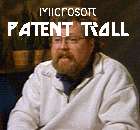

THE ENTITY known as Intellectual Ventures, a patent troll of massive proportions (kick-started by Microsoft and run by a former Microsoft CTO), is already suing companies directly. It is reportedly attacking even Linux/Android (by coercion on the face of it, through extortion just like Microsoft's). Mike Masnick helps show that Intellectual Ventures is still fuelling court battles using patents, too:
Last year, we noted that more and more patents previously held by Intellectual Ventures were showing up in lawsuits -- with rumors swirling that IV still got a cut of money collected on at least some of those patents. Then, in December, IV finally filed its first patent infringement lawsuits directly. However, more of its "former" patents are popping up in lawsuits as well. Joe Mullin has the details of yet another secretive shell patent holding company, called Pragmatus, that has some former IV patents and sued Facebook, YouTube and Linkedin last year, and now is suing basically all of the cable industry, claiming that its patents (5,581,479 and 5,636,139) cover the rather broad concept of video-on-demand.
[...]
Once again, the deeper you dig into these stories, you realize that it's really just a bunch of lawyers passing around patents to figure out who can sue companies who actually do stuff. This is why it's frustrating when the press falls for IV's ridiculous spin about how it's really inventing things. As far as we can tell, nothing "invented" at IV has hit the market in any meaningful way in its many years of existence.
“In some ways, Microsoft can also do the laundering using Nathan Myhrvold.”But wait, that's not all. Microsoft's co-founder (another one of Microsoft's patent trolls) who is now suing Android, is rapidly becoming a loathed individual (unless one judges this by the Seattle press, which also showers the Gates Foundation with kisses). The owner or originator of the patent that Traul Allen [sic] of Microsoft and Interval Extortion [sic] (extorting in intervals) is using makes a revealing statement.
"Statement from inventor of Interval Licensing patent on a suit that "will likely exceed annual budget of [NEA]"," summarises this the EFF, which has a patents-busting project. To quote this message from yesterday:
I am listed as lead inventor on patent number 6,757,682, “Alerting Users to Items of Current Interest”, one of the four asserted patents in the Interval Licensing lawsuit. The origin of the patent was an Interval Research project exploring how to find live events as they happen. The project was focused and specific, and led to, among other things, an Interval spinoff venture called Kundi.com, which built a working, publicly-accessible system in 2001. I am grateful for our team and proud of our accomplishments.
[...]
But the stage is now set for enormous resources, from all sides, to support litigation over innovation. The creative community needs all the support it can muster, and it’s a perplexing thought that the money at risk in this lawsuit will likely exceed the annual budget of the National Endowment for the Arts, possibly several times over. It could be hugely significant if all parties commit to something good for the creative community as an outcome.
thinkprogress.org, a very popular Web site which is clearly concerned about what the USPTO has done to the United States:
To offer an analogy that I actually think isn’t stretched at all, but 21st century standards Isaac Newton should have patented calculus (“A Method For Using Fluxions To Determine Instantaneous Rate of Change”) and then waited patiently until Leibniz published his superior method and then sued the pants off anyone who tried to take a derivative without coughing up a hefty license fee. But would that world have been a better place? The issue isn’t really so much the rents that Newton would have thereby extracted (I’m not going to begrudge one of human history’s greatest geniuses a fortune) but the barriers to entry that would have been created as a secondary consequence. A world in which smart people have access to the stock of existing human knowledge and are free to apply it in new ways is a world of competition and innovation. A world where you need to consult with an army of lawyers first isn’t. If you ask the people who care most about promoting entrepreneurship in America about this they kind of shrug, concede that the patent system is hopelessly broken, and then confess to despair that it can or will be fixed.
In a broader sense, a lot of our politics is about symbolism. And symbolically intellectual property represents itself in the contemporary United States as a kind of property—it’s right there in the name. But it’s better thought of as a kind of regulation. Patents and copyrights are modeled, economically, the same as you would model any state-created monopoly.